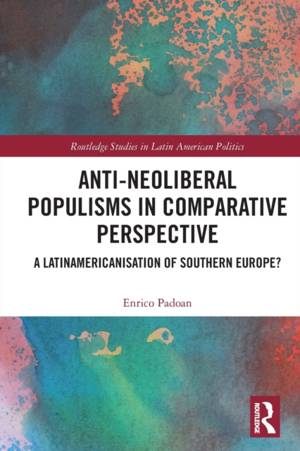
- Afhalen na 1 uur in een winkel met voorraad
- In januari gratis thuislevering in België
- Ruim aanbod met 7 miljoen producten
- Afhalen na 1 uur in een winkel met voorraad
- In januari gratis thuislevering in België
- Ruim aanbod met 7 miljoen producten
Anti-Neoliberal Populisms in Comparative Perspective
A Latinamericanisation of Southern Europe?
Enrico PadoanOmschrijving
In this book, Enrico Padoan proposes an original middle-range theory to explain the emergence and the internal organisation of anti-neoliberal populist parties in Latin America and Southern Europe, and the relationships between these parties and the organised working class.
Padoan begins by tracing the diverging evolution of the electoral Lefts in Latin America and Southern Europe in the aftermath of economic crises, and during the implementation of austerity measures within many of these nations. A causal typology for interpreting the possible outcomes of the realignments within the electoral Lefts is proposed. Hereafter, the volume features five empirical chapters, four of which focus on the rise of anti-neoliberal populist parties in Bolivia, Argentina, Spain and Italy, while a fifth offers an analysis on four 'shadow cases' in Venezuela, Uruguay, Portugal and Greece.
Scholars of Latin America and Comparative Politics will find Anti-Neoliberal Populisms in Comparative Perspective a highly valuable resource, offering a distinctive perspective on the impact of different populisms on party systems and on the challenges that such populisms posed to syndicalism and to traditional left-of-centre parties.
Specificaties
Betrokkenen
- Auteur(s):
- Uitgeverij:
Inhoud
- Aantal bladzijden:
- 310
- Taal:
- Engels
- Reeks:
Eigenschappen
- Productcode (EAN):
- 9780367620806
- Verschijningsdatum:
- 30/05/2022
- Uitvoering:
- Paperback
- Formaat:
- Trade paperback (VS)
- Afmetingen:
- 152 mm x 229 mm
- Gewicht:
- 417 g

Alleen bij Standaard Boekhandel
Beoordelingen
We publiceren alleen reviews die voldoen aan de voorwaarden voor reviews. Bekijk onze voorwaarden voor reviews.









